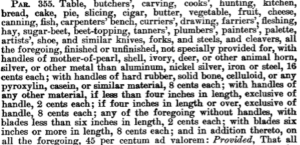Chapter 5: The Smoot-Hawley Tariff, the Revenue Act of 1932, and Crush of the Great Depression
The income tax replaced the tariff as the engine of the federal tax system—with profound consequences for American political economy.
1. The self-parody of the tariff
The prose of tariff statute is unintentionally comic. The specificity of duty schedules is absurd. Here is the Smoot-Hawley tariff (1930) on the implements of foot care:

This section of the tariff (page 619) continues with unintentional levity on the matter of knives:

This statute goes on in this vein for 90 pages. The law: 71st Congress, Session II, Ch. 491, 1930.
2. Here is an essay from Brian Domitrovic noting the difficulty in telling the difference between the language of the tariff and that of the purple-prose satirist Tom Wolfe, “The Tariff or Tom Wolfe? It’s Hard To Tell,” here.
